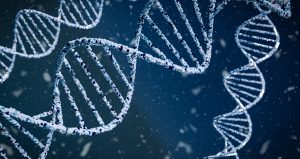
How epigenetics can improve our care?
Epigenetics, or the study of changes in gene activity, is taking up more and more space in scientific debates, because it is surprising.
How to explain that a bee larva will sometimes become queen or worker depending on how it is fed, or why the same egg can hatch male or female depending on a simple change in temperature?[1]
Thus, would we define our personal characteristics, our habits, our lifestyles? Could our traumas be part of our genes, and above all, can we have any impact on them?
This is the question posed by the scientific community, which closely studies how our genes evolve and by what process are transmitted characteristics that are supposed to be specific to an individual. In the same way, how does the environment in which the cell flourishes affect it in an “irreversible” way and mark its genotype?
This fascinating observation of an environmental impact and a genetic transmission of characteristics allows us to consider our own genetics in a completely different way. Certain characteristics, such as our tastes, our predispositions to such and such behavior, or even our constitutional weaknesses could be explained thanks to this genetic transmission, a heritage of our living conditions, of our parents but also perhaps, of our ancestors. more distant.[2]
We also observe that stress affects the genotype, and transforms it radically. Astudy carried out by German researchers has shown that baby mice, having been separated from their mothers for three hours a day for 10 days, thus undergoing stress, carry the permanent epigenetic mark on the gene responsible for coding the stress protein, the vasopressin. There is therefore a link between this epigenetic mark and stress.
The human genome can also be affected. A study of brains from deceased people, which were preserved for research, showed that epigenetic marks were present on the NR3CI gene, which was modified in the hippocampus in people who had committed suicide and who had been abused in childhood. The childhood stress suffered would have irreversibly affected their genotype, and therefore perhaps their behavior in adulthood.
However, should we think that we are predestined by our genotype, to certain behaviors or diseases, without having any power to reverse the trend?
The answer remains unclear, but what is certain is that if our genotype is able to change once, it is proof of its adaptability and plasticity. Thus, if we follow this logic, it would be possible to “code” new positive genetic modifications, or at least bring positive evolutions thanks to a particular attention paid to our environment, our quality of life and our level. of stress.
The subject of the impact of trauma and its multiple negative effects on the genotype, particularly in people who have been marked by post-traumatic stress, is perhaps what should attract our attention in patients/consultants suffering from ailments that have appeared suddenly following emotional shocks, and finding no organic explanations.
The hereditary nature of the effects of trauma and its impact on the genotype could perhaps be reversed by treatment of traumatic memories, as well as the effects of stress, in particular oxidative stress, on the organism, in order to secure the patient and bring him back from a state of survival to a state of safety.
Since the disease has multifactorial causes, it is interesting to look at the genotypic origin of the conditions that allowed its appearance, in order to offer the patient/consultant the widest range of explanations and solutions that can promote their return to full health, and not to resign oneself to the fatality of an illness, a temperament, or hereditary weaknesses. The patient/consultant thus becomes an actor in his “healing”, and better understands the origin of his ailments.
Research may soon bring us more answers to this mystery that is the human genome and allow us to approach the patient/consultant in the most complete holistic view possible.
Chiara PORTE-HAQUIN, AMCC Student
https://www.chiaraportehaquin.fr/
https://snipfeed.co/chiaraportehaquin
[1] 1 Source : https://fr.wikipedia.org/wiki/%C3%89pig%C3%A9n%C3%A9tique
[2] Source : Mamouth Magazine, n°9 de janvier 2011




Leave a Reply